This article was written on April 7, 2025. Sources include BBC Türkçe, Euronews, DW Türkçe, NTV Haber, Birgün.net, Onedio, AFP, AP, and Reuters.
Following the arrest of Istanbul Mayor Ekrem İmamoğlu on March 19, widespread protests have broken out across Turkey, as citizens rally against what they perceive as President Erdoğan’s escalating suppression of political opposition.
Why Was the Mayor of Istanbul Arrested?
Charges Against Istanbul Mayor Ekrem İmamoğlu
1. Corruption and Bid Rigging
Authorities accuse İmamoğlu of abusing his power during his term in office through:
- Coercing businesses into making donations using his official capacity
- Appointing former associates to key positions within the municipal government
- Manipulating public tenders and price controls
- Pressuring non-cooperative businesses for bribes
- Diverting illicit gains into private construction projects
The investigation involves over 100 individuals, including several of İmamoğlu’s close aides.
2. Supporting the Terrorist Organization PKK
The “Urban Consensus (Kent Uzlaşısı)” was an electoral alliance formed ahead of the March 31, 2024 local elections between the Republican People’s Party (CHP) and the Peoples’ Equality and Democracy Party (DEM Parti).
Authorities have launched an investigation into this political alliance, alleging ties to the Kurdistan Workers’ Party (PKK). Prosecutors claim that individuals with suspected terrorist links were employed within municipal bodies such as the Urban Planning Directorate and BİMTAŞ, Istanbul’s utility and infrastructure contractor.
What Is the PKK?
The Kurdistan Workers’ Party (PKK) is a Kurdish nationalist militant organization founded in Turkey in 1978 by Abdullah Öcalan. The group originally sought to establish an independent Kurdish state—Kurdistan—and has since been involved in decades of armed conflict with the Turkish government.
The PKK is officially designated as a terrorist organization by Turkey, the United States, and several other countries.
He was abruptly arrested on charges related to these two offenses, resulting in the revocation of his academic degree and dismissal from his position. He continues to remain in custody.
Who Is Ekrem Imamoglu
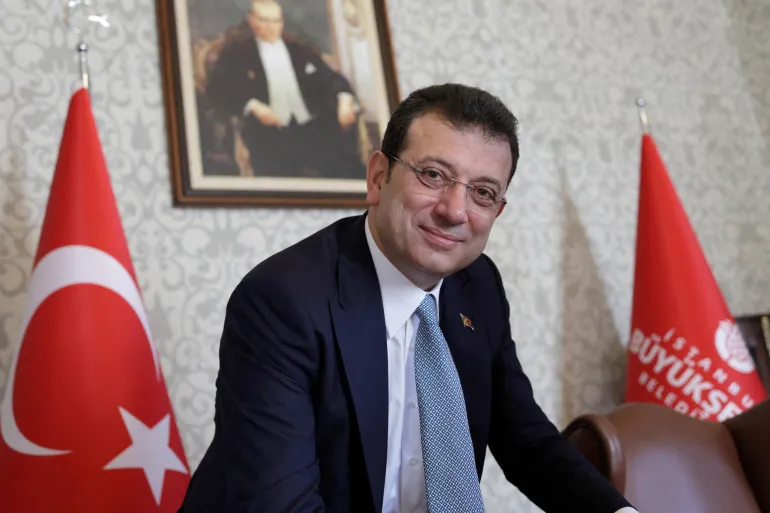
Ekrem İmamoğlu, a prominent figure within Turkey’s largest opposition party, the Republican People’s Party (CHP), is widely regarded as the frontrunner for the party’s presidential candidacy. He is also seen as the primary challenger to Turkey’s current president and leader of the ruling Justice and Development Party (AKP), Recep Tayyip Erdoğan, in the 2028 Turkish presidential election.
What is the Republican People’s Party (CHP)?
The Republican People’s Party, or Cumhuriyet Halk Partisi, is Turkey’s main opposition party and the second-largest party in the country’s parliament. It holds the distinction of being Turkey’s oldest political party, founded by Mustafa Kemal Atatürk, the nation’s founder.
İmamoğlu Arrest Sparks Surge in Solidarity Voting
On March 23, 2025, Turkey’s Republican People’s Party (CHP) held its primary election to select its candidate for the 2028 Turkish presidential election, with Ekrem İmamoğlu emerging as the sole contender. Initially, the primary was restricted to party members, but following İmamoğlu’s arrest on March 19, the CHP leadership made a last-minute decision to open the vote to all citizens as a show of support for him.
In response, the CHP established the “Dayanışma Sandığı” (Solidarity Voting Box), encouraging not only party members but also any citizen wishing to vote to participate. The primary saw an unprecedented turnout, with a total of 15 million citizens casting ballots in favor of İmamoğlu. Of these, 13 million votes came from non-party members. As a result, İmamoğlu was confirmed as the CHP’s presidential candidate.
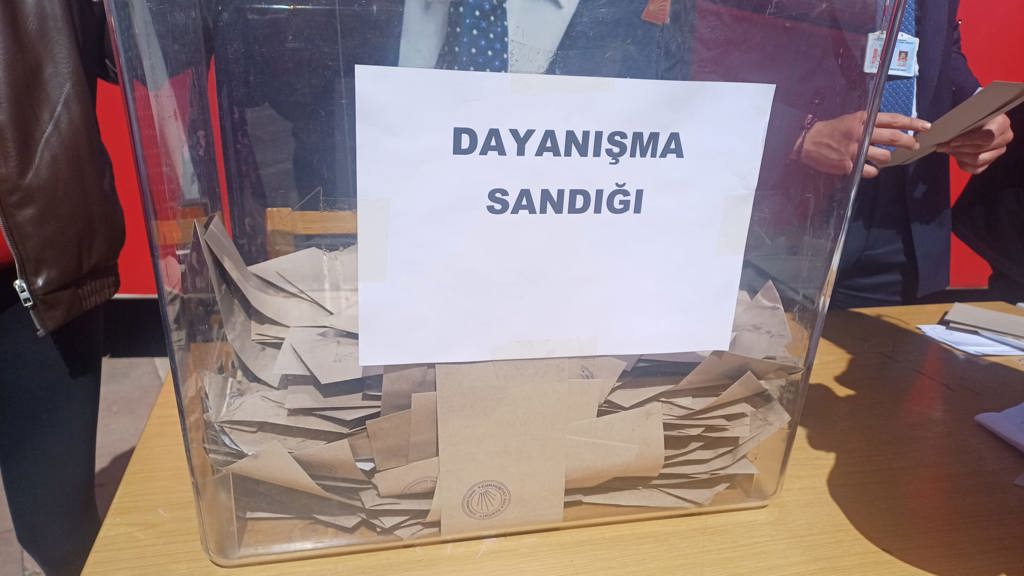
What is the Dayanışma Sandığı (Solidarity Voting Box)?
The “Dayanışma Sandığı” (Solidarity Voting Box) is a voting mechanism specifically established for individuals who are not members of the Republican People’s Party (CHP). It allows these citizens to participate in the primary election process for selecting the party’s presidential candidate.
Erdoğan, We’ve Had Enough!
Following the announcement of the primary election results, Ekrem İmamoğlu, currently detained, posted on social media from Silivri Prison
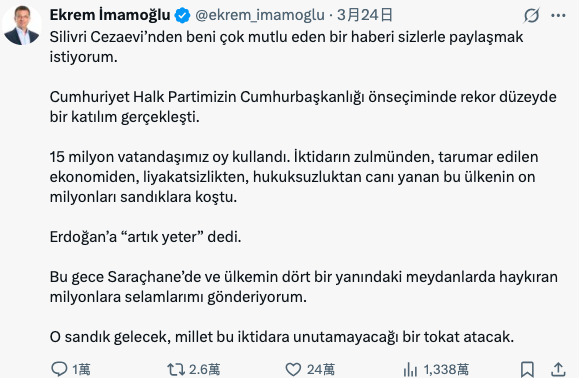
“I am thrilled to share some joyful news from Silivri Cezaevi. The Republican People’s Party’s presidential candidate primary saw a record-breaking turnout, with 15 million citizens casting their votes. In the face of government oppression, a devastated economy, incompetent appointments, and judicial injustice, millions of suffering citizens rushed to the ballot box to tell Erdoğan, ‘We’ve had enough!’”
The primary is widely regarded by observers as a reflection of the Turkish public’s deep-seated frustration with the long-standing grievances against the Erdoğan administration.
İmamoğlu’s Arrest: Does It End His Presidential Bid?
Despite Ekrem İmamoğlu’s ongoing detention, there are currently no legal provisions in Turkey that prevent him from running as a presidential candidate or being elected president.
According to the Turkish Constitution, presidential candidates must meet the following requirements:
- Hold a university degree
- Be at least 40 years old
- Have no finalized criminal conviction
At present, İmamoğlu is under investigation and in detention, but no final conviction has been issued, meaning his eligibility to run remains intact. His legal team has already filed an appeal.
Should he be convicted in connection with the ongoing investigation and barred from political activity, he would lose his eligibility to run. Additionally, while İmamoğlu has won the CHP primary, he is not yet an official candidate. Formal nomination requires the CHP parliamentary group to submit his candidacy after the Supreme Election Council (YSK) announces the election schedule, and at that time, he must have no finalized criminal record.
Why Was İmamoğlu’s University Diploma Revoked?
İmamoğlu studied English Business Administration at Girne American University (GAÜ) in Northern Cyprus from 1988 to 1990 before transferring to Istanbul University. Following a request from the Istanbul Prosecutor’s Office, the Turkish Higher Education Council (YÖK) and Istanbul University conducted an investigation into the matter. Their report concluded that while İmamoğlu met the transfer requirements at the time, the process ultimately violated YÖK regulations, leading to the revocation of his diploma.
İmamoğlu’s team counters that his transfer fully complied with the conditions published at the time and notes that GAÜ was only declared unrecognized by YÖK more than a year after his transfer.
For now, this decision does not pose a barrier to his presidential candidacy. He has filed an objection with the administrative court, and if the diploma revocation is upheld, he retains the right to appeal further. His legal team has stated that, should the situation worsen, they are prepared to escalate the case to Turkey’s Constitutional Court and the European Court of Human Rights (ECHR) on grounds of “human rights violations.”
Even if elections proceed during this period, İmamoğlu can still apply to run. His ultimate eligibility will be determined by the Supreme Election Council (YSK).
Turkey Erupts in Largest Protests in a Decade
Following the arrest of Ekrem İmamoğlu, Turkish citizens, enraged by the increasingly authoritarian rule of President Recep Tayyip Erdoğan’s government and alarmed by the erosion of the secular and democratic values—along with the rule of law—that have underpinned Turkey since its founding, have taken to the streets in protest. This unrest has escalated into the largest demonstrations in Turkey since the Gezi Park protests, marking a significant outpouring of public discontent.
The protests united individuals from vastly different backgrounds and even opposing political stances, highlighting a rare moment of collective resistance.
What Were the Gezi Park Protests?
The Gezi Park protests, also known as “Occupy Gezi” or the “Turkish Spring,” erupted in Turkey on May 28, 2013. The movement began with approximately 50 environmentalists camping in Istanbul’s Taksim Gezi Park to oppose government plans to redevelop the area into a shopping mall. The police’s harsh response—evicting protesters and burning their tents—sparked widespread outrage, quickly transforming the demonstration into a nationwide anti-government uprising.
The protests spread to hundreds of cities, including Ankara, Antalya, and Bodrum, with millions taking to the streets. Participants represented a diverse coalition spanning ethnic groups and political ideologies, including leftists, secularists, liberals, nationalists, Kurds, Armenians, Greeks, and Jews. Their demands extended beyond environmental concerns, encompassing broader grievances against then-Prime Minister Erdoğan’s authoritarian governance, restrictions on alcohol policies, bans on public displays of affection, and dissatisfaction with Turkey’s Syria policy.
During the unrest, rather than addressing the crisis domestically, Prime Minister Erdoğan embarked on a visit to North Africa on June 3, drawing further criticism. That same day, Turkish trade unions declared a nationwide strike, underscoring the scale of societal discontent and mobilization. The movement was widely regarded as the greatest challenge to Erdoğan’s decade-long rule at that time.
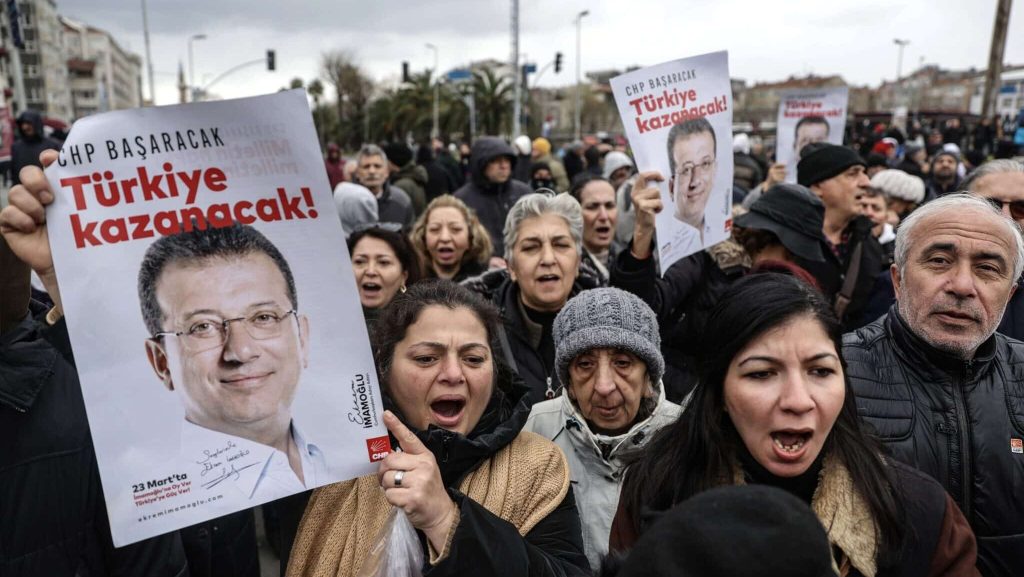
Students Emerge as Protest Vanguard
Not for Parties, but for Freedom, Human Rights, Law, and Justice
On March 25, thousands of students gathered at Maçka Democracy Park in Istanbul, marking the largest student rally in Turkey in a decade.
The students emphasized that their stand was not in support of any political party or individual, but rather for a society governed by freedom and justice, underpinned by an impartial judicial system free from government interference.
According to BBC Turkey, most students concealed their faces with masks or towels and took care to avoid revealing their names or being photographed in reports, citing fears of arrest or being placed under surveillance.
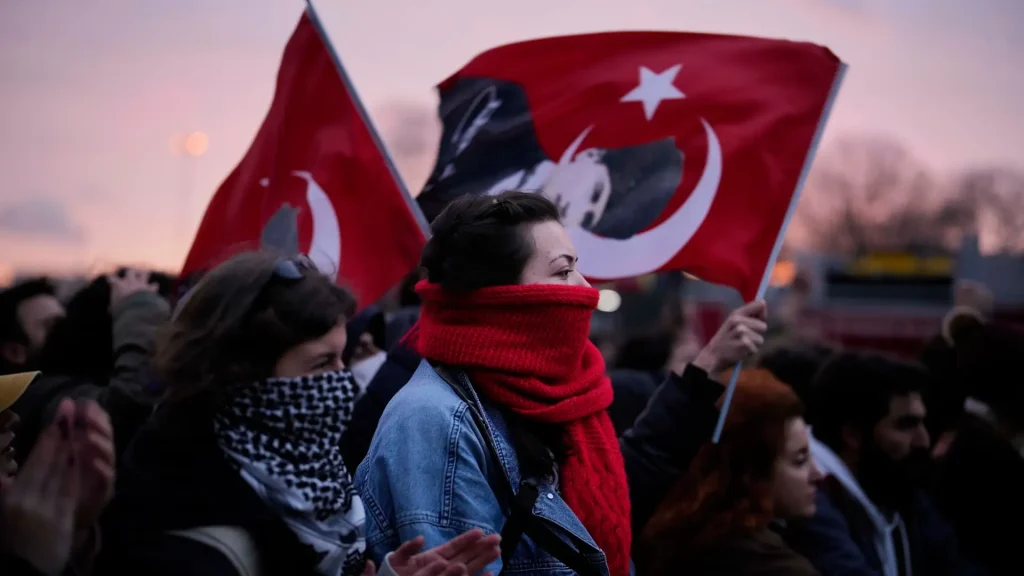
A student from Istanbul Technical University stated, “As young people, we want a Turkey where we can protest without having to cover our faces.”
Meanwhile, a student from Marmara University reiterated, “The issue isn’t that İmamoğlu was arrested—it’s that others haven’t been.” The students demanded that authorities expand their investigations to include not only the Republican People’s Party (CHP) and other opposition groups but also the ruling Justice and Development Party (AKP), insisting on impartial scrutiny across all political factions.
This protest wave has been spearheaded by the younger generation, with students from prominent institutions—such as Istanbul University, Middle East Technical University, Hacettepe University, Istanbul Technical University, Galatasaray University, Koç University, Sabancı University, Boğaziçi University, and Kadir Has University—leading marches in major cities like Istanbul, Ankara, and Izmir.
the most frequently heard slogans during the demonstrations
“Ekrem dışarı, Tayyip içeri” (“Ekrem out, Tayyip in”)—a demand for İmamoğlu’s release from detention and Erdoğan’s imprisonment in his stead.
“Mustafa Kemal’in askerleriyiz” (“We are the soldiers of Mustafa Kemal”)—a rallying cry affirming allegiance to the secularist ideals of Turkey’s founder, Mustafa Kemal Atatürk.
“Diplomasız Erdoğan” (“Diploma-less Erdoğan”)—a taunt referencing the long-standing controversy over President Erdoğan’s academic qualifications.
Turkey’s Protests Take Creative Turns: Whirling Dances and Pikachu Costumes?
Turkish citizens, seasoned in the art of protest, have long mastered diverse and imaginative ways to voice their demands. I
n the latest wave of demonstrations, one man stood out, dressed as a Sufi dervish, spinning gracefully while wearing a gas mask amid clouds of tear gas.
Meanwhile, another protester took a lighter approach, donning a Pikachu costume and darting through the streets in what could be described as a real-life Pokémon chase. These scenes, both humorous and striking, highlight the resilience and creativity of the Turkish people in the face of adversity.
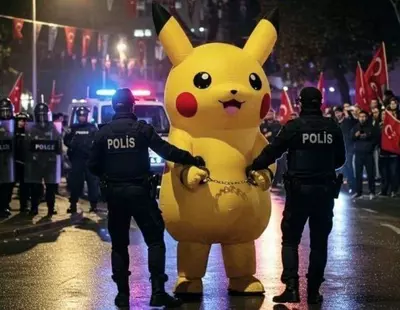
AFP Journalist Arrested at Home, BBC Reporter Detained and Deported
Yasin Akgul, a 35-year-old veteran photojournalist with Agence France-Presse (AFP), has covered conflict zones from war-torn Syria to Islamic State-controlled Iraq over the past decade. While he says he has been beaten by police multiple times while photographing events in his hometown,Turkey, this marked the first time he was arrested at his own home.
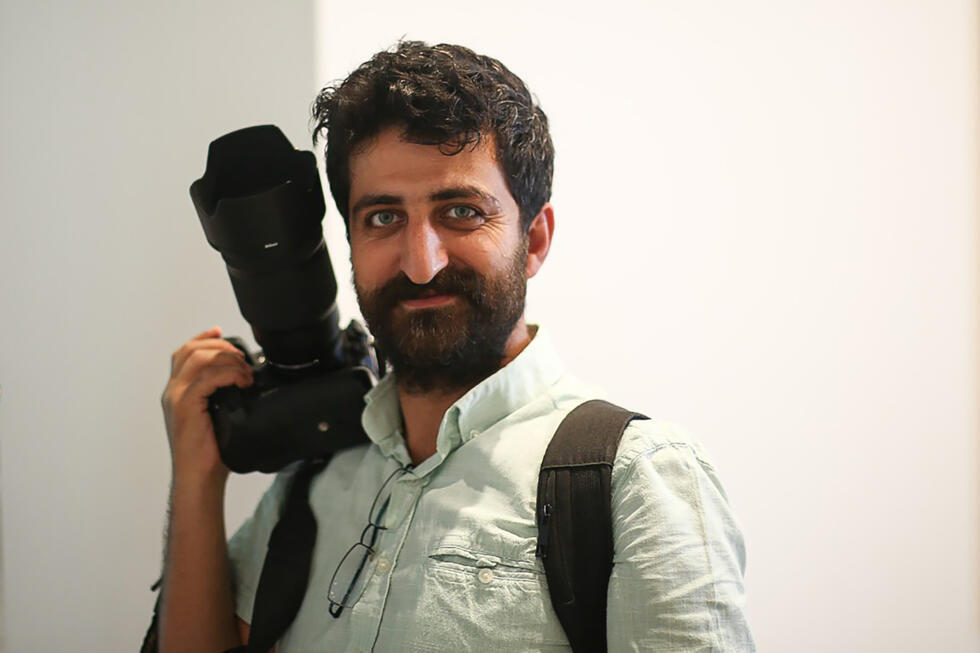
In the early hours of March 23, 2024, police raided Akgul’s residence in Istanbul. He was one of seven journalists arrested in the operation, all of whom had been reporting on the ongoing protests. Charged with “participating in an illegal assembly,” Akgul views his arrest as part of a broader government effort to intimidate the media and suppress press freedom.
He stated that the government’s intent is clear: to prevent anyone from documenting what he describes as the largest unrest in Turkey in over a decade. Akgul believes the arrested journalists were not chosen at random but were deliberately targeted as experienced photojournalists to remove them from the front lines. Many of his journalist colleagues, he added, now face charges or fear future prosecution, prompting some to leave the country entirely.
“The day after our arrests, many freelance journalists didn’t dare go out to shoot,” he said. “Everyone is terrified.”
Akgul was released from prison in the early hours of March 27.
Meanwhile, BBC journalist Mark Lowen was detained in Istanbul for 17 hours before being deported. Official documents cited him as “a threat to public order.” Only after the BBC reported the incident did Turkish authorities claim that Lowen’s deportation stemmed from his “lack of press accreditation.”
Istanbul Deputy Secretary General Polat Arrested
Mahir Polat, 49, a renowned expert in Turkey’s cultural heritage preservation, museology, and architectural history, has been deeply involved in numerous projects documenting and safeguarding Istanbul’s historical and cultural legacy.
On March 23, 2025, Polat was arrested as part of an investigation, accused by authorities of aiding the Kurdistan Workers’ Party (PKK) and its affiliated Kurdistan Communities Union (KCK) terrorist organizations through his alleged role in the “Kent Uzlaşısı” (Urban Consensus) political alliance.

What is the Kent Uzlaşısı Political Alliance?
The “Kent Uzlaşısı” (Urban Consensus) refers to an electoral alliance formed between the Republican People’s Party (CHP) and the Peoples’ Equality and Democracy Party (DEM Parti) ahead of Turkey’s local elections on March 31, 2024.
This arrest has further fueled public outrage in Turkey, with many viewing the charges as fabricated and the detention as an unjust targeting of a dedicated civil servant committed to preserving the nation’s history and culture. Renowned Turkish war journalist Çoşkun Aral has publicly voiced his support for Polat on social media.
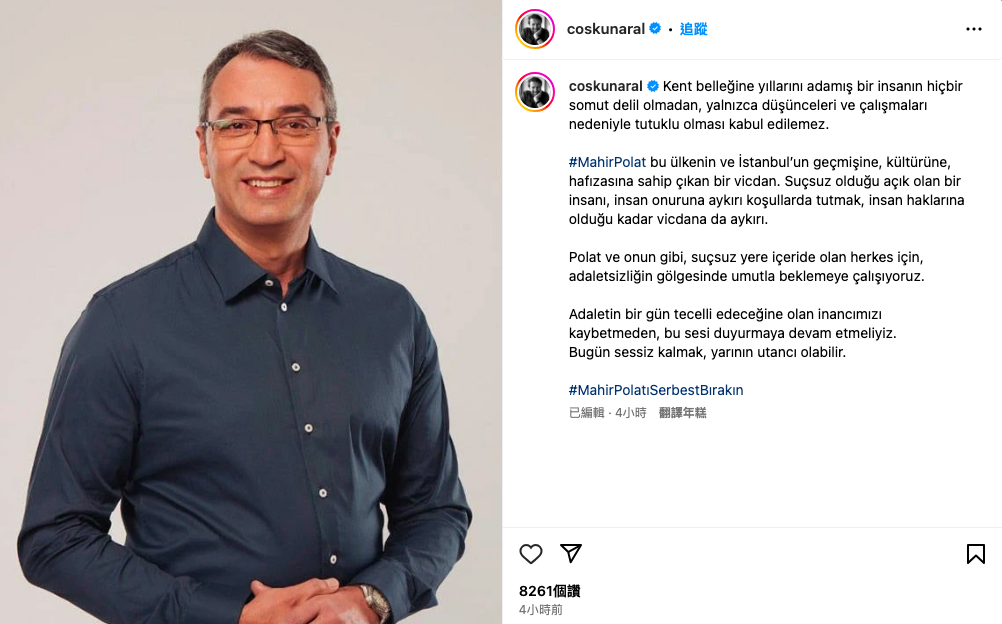
Amid deteriorating health, Polat was urgently transferred from Silivri Prison, where he was being held, to Mehmet Akif Ersoy Chest Diseases Hospital on the evening of March 29. He was admitted to the intensive care unit and underwent cardiac catheterization surgery the following day.
Students Arrested, Nationwide Boycott Launched in Solidarity
Özgür Özel, chairman of the Republican People’s Party (CHP), revealed that since the protests began, 310 students have been arrested and detained, unable to reunite with their families during the holy month of Ramadan.
In a show of support for these students, students from universities such as Boğaziçi University, Istanbul University, Middle East Technical University (ODTÜ), and Galatasaray University have taken to social media platforms like Instagram, Facebook, and X to launch the
April 2 Boycott #2nisantüketimboykotu

The campaign urges the public to refrain from all consumption on April 2, 2025. Organizers have called on citizens to stock up on household essentials before the date and to abstain from shopping, visiting supermarkets, online purchases, dining out, refueling, buying coffee, or paying bills on that day. The initiative aims to leverage collective economic pressure to demand the release of the detained students and challenge the government.
Numerous small and medium-sized businesses have also expressed solidarity, pledging to suspend operations on April 2 in support of the cause.
However, according to the state-run Anadolu Agency, the Istanbul Prosecutor’s Office has announced plans to investigate individuals who initiated or shared the boycott calls, citing charges such as “inciting hatred.”
Beyond the consumer boycott, professors and students from various universities have also launched strikes to protest the government’s actions, amplifying the growing unrest.
Pro-Government Media and Businesses Face Nationwide Boycott!
In a bold move to counter the Erdoğan administration’s crackdown, the Republican People’s Party (CHP) has launched a “Media and Business Boycott” campaign, urging the public to shun enterprises aligned with the government.
The boycott targets a wide range of entities, including television stations, news outlets, supermarkets, restaurants, and car brands. Among those listed are the state-run broadcaster TRT (Türkiye Radyo Televizyon Kurumu), the popular restaurant chain MADO, the retail chain Watsons, and Turkey’s prominent bookstore chain D&R
Click here to view the full boycott list.
British band Muse has also joined the fray, postponing its scheduled June 11, 2025, concert in Istanbul to 2026. The decision came after the event’s organizer, DBL Entertainment, was included in the boycott. Muse further announced it would cease all future collaboration with DBL Entertainment in response to the campaign.
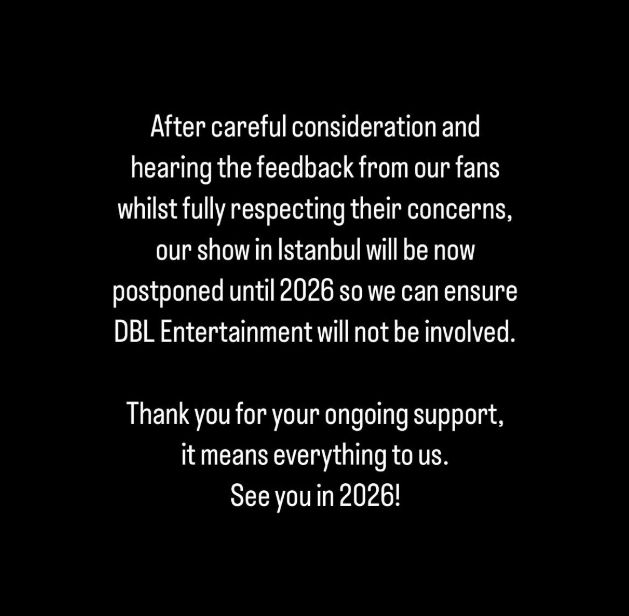
Norwegian singer Ane Brun took to Instagram to announce, “I’ve decided not to perform in Istanbul… this isn’t the right time.” She confirmed the cancellation of her scheduled October performance in the city, joining the growing list of international artists responding to Turkey’s ongoing unrest.
Does a One-Day Consumption Boycott Make a Difference?
According to data from Turkey’s Interbank Card Center (Bankalararası Kart Merkezi), monthly credit and debit card spending in Turkey totals 1.472 trillion Turkish lira (TL), averaging approximately 52 billion TL per day. Additionally, a report from World Pay Global indicates that 27% of transactions in Turkey are cash-based. Factoring this in, the country’s total daily spending reaches an estimated 65 billion TL.
A report by the Turkish Institute of Social Studies (Toplum Çalışmaları Enstitüsü) revealed that the nationwide consumption boycott on April 2, 2025, significantly impacted consumer demand. A survey found that 56% of merchants reported a drop in sales on that day.
The Central Bank of Turkey also noted a 26% decline in consumption demand on April 2, despite the boycott coinciding with a peak shopping period just before the nine-day Ramadan holiday. The boycott’s effects were most pronounced in areas with strong opposition support, where foot traffic and spending noticeably decreased, while regions loyal to the ruling party saw minimal impact.
In response, supporters of the ruling party and political figures deliberately increased their spending on the day to counteract the boycott’s effects.
Turkish Trade Minister Ömer Bolat, for instance, made a point of shopping on April 2 and stated:
“The opposition’s attempt to use a shopping boycott to obscure corruption and bribery investigations and to harm the economy has failed, thanks to our citizens who stood up to support the national economy, businesses, and markets.”
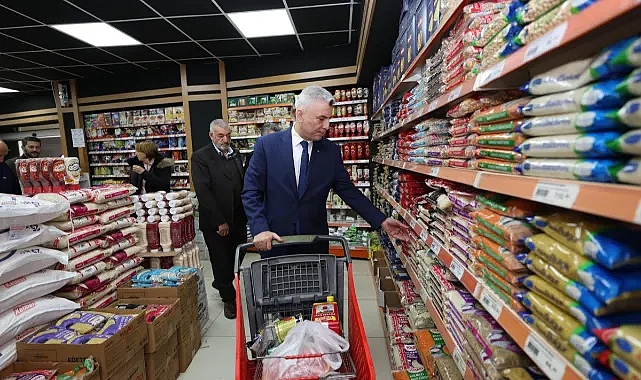
Turkish Interior Minister Ali Yerlikaya took to social media at 3 a.m., condemning the boycott with a post:
“This call is an attack on our economic independence! This boycott threatens the livelihoods of tens of thousands!” He stressed that it was not a mere boycott but an act of national harm, using the hashtag
#BoykotDeğilMilliZarar (“Not a Boycott, National Damage”).
The largest protests in Turkey in a decade show no signs of abating.
Stay tuned to turkiyetaiwan.com for the most detailed, firsthand updates on the unfolding situation in Turkey!
![]()

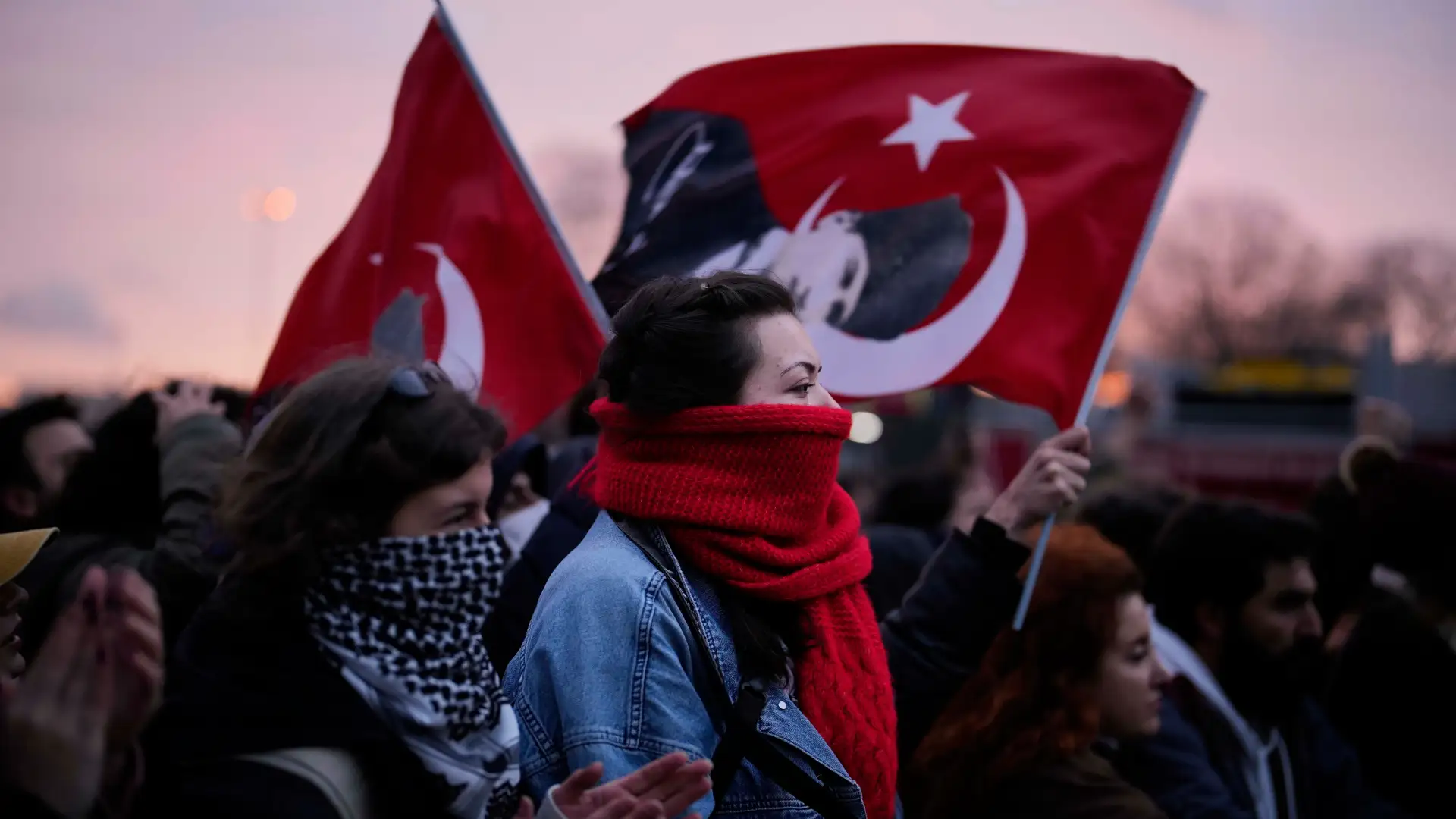
Leave a Reply